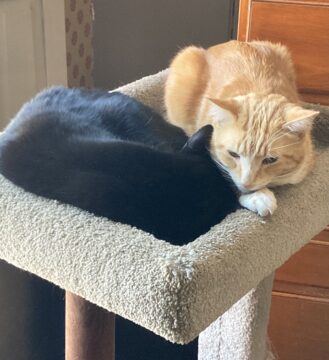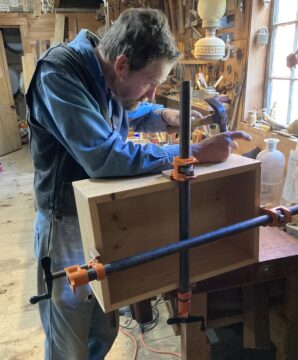by Mike Bendzela

How happy to have discovered the history of other species, as well as our own. How fortunate to be alive during the time when the evolutionary puzzle has been so masterfully worked out, assembling a picture so stunning in its completeness, that mere school children now know more about Darwin’s great idea than even Darwin himself knew.
And yet, how mortifying to be stuck with natural selection as “the mother of beauty,” to crib from the poet Wallace Stevens. (“Death is the mother of beauty; hence from her,/ Alone, shall come fulfillment to our dreams/ And our desires.”) Accepting this brute fact of life is a tall order, and I still recoil whenever I contemplate what Darwin called the “sufferings of millions of the lower animals throughout almost endless time.”
The central tenet of life is directionless, indifferent, insensate, implacable natural selection. And yet . . . here we are.
*
We have — or had — five cats. Four are sibs, seven years old now, Girly, Rocky, Pinky, and Scooter. They showed up, mere kittens clustered near their scrawny mother, behind our barn, as my husband Don was recovering from a stroke that occurred the year before. The fifth, Maggie, showed up just last summer, barefoot and pregnant, on our back doorstep. She hated and still hates the others. She eventually gave birth to four kittens of her own, which we judiciously distributed, but we still have to keep her separate from the other cats.
While returning from teaching one day earlier this month, I saw Rocky, our black, tuxedo male, vaulting across the road, his skinny ass stretched out like a black snake as he made it safely to the other side.
“I just saw Rocky sprinting across the road in front of me,” I said to Don. “Prepare yourself. We’re going to lose that cat.” I sometimes actually believe that articulating a fear helps to diminish it . . .
*
I like to teach some of my favorite nature poems to young writers in my Creative Writing course. It’s more like a literature course, as I cannot really teach them how to write; I can only point to good writing and say, “Look. See?”
Some staple nature poems are Dickinson’s “A Narrow Fellow in the Grass,” Elizabeth Bishop’s “The Fish,” “After Apple Picking” by Frost. There is one poem that horrifies me, and I am loathe to teach it, but I keep coming back to it, because of its sting: “The Bloody Sire” by Robinson Jeffers.
It is not bad. Let them play.Let the guns bark and the bombing-planeSpeak his prodigious blasphemies.It is not bad, it is high time,Stark violence is still the sire of all the world’s values.
He wrote this in the midst of the invasions, carpet-bombing, and genocide of World War Two. I literally cannot imagine any of it. The poet’s blank-faced delivery of the atrocities of war raises the hairs on the back of my neck. What can he mean that war “is not bad”? War is “play”? All values emerge from such chaos? From this I recoil.
*
The second stanza is where nature comes in and is the reason why I pair this poem with the other nature poems. It also helps clarify and even naturalize that appalling first stanza. It contains the most gorgeous description of natural selection that I have ever encountered.
What but the wolf’s tooth whittled so fineThe fleet limbs of the antelope?What but fear winged the birds, and hungerJewelled with such eyes the great goshawk’s head?Violence has been the sire of all the world’s values.
That last line reiterates the abominable sentiment that closes out the first stanza: Violence is the father of value. The time frame has shifted, though, from is still to has been. What’s true now has always been true. What’s true about contemporary warfare is just the truth of deep time brought forward.
In a Biology course I took on evolution, one of the most difficult things for me to fathom was how natural selection could be seen as a creative force, not just a force that wipes out the maladapted. In that stanza, we see how natural selection acts as a lathe, turning out those antelope appendages; as an impulse, prompting an ancient theropod to burst into flight; as appetite illuminating acute vision. The reiteration of the line sire of all the world’s values comes like, “See? Told you so.” Predatory nature contains its own “prodigious blasphemies.” The idea seems to come right out of “Recapitulation and Conclusion” of On the Origin of Species:
Thus, from the war of nature, from famine and death, the most exalted object which we are capable of conceiving, namely, the production of the higher animals, directly follows.
*
What world values is Jeffers talking about? Peace after the war? Renewal? That first stanza does not give us a clue. The second stanza, the one about natural selection, at least shows us the “fleet limbs,” “winged . . . birds,” and “Jewelled . . . eyes” that result from the cruel operations of nature, features we would call adaptations. We have to look to the third stanza for the values sired by civilization’s cruelties:
Who would remember Helen’s faceLacking the terrible halo of spears?Who formed Christ but Herod and Caesar,The cruel and bloody victories of Caesar?Violence, the bloody sire of all the world’s values.
In other words, were it not for the Trojan War, “the face that launched a thousand ships” would be mere dust. By implication, without war, the literary monuments The Iliad and The Odyssey would not exist. How’s that for values?
Likewise, were it not for Herod (Antipas) and Caesar, the executions of both John the Baptist and Jesus of Nazareth would not have occurred, and we would not have the legends of the Christ, nor the Gospels. Beatings, humiliation, and torture preceded the crucifixion, the way the Slaughter of the Innocents (perpetrated by Herod the Great) preceded the Epiphany; suffering must precede redemption. Religion is sometimes positively Darwinian in its implications.
And yet these still seem meager rewards for history’s corpses piled steeper than mountain ranges.
This essay would not have occurred to me were it not for what happened to us last week. It’s not what I wanted to write about this month, but I cannot get it out of my mind.
I was in a bit of a rush to get my music gear — fiddle and banjo — into my truck to make it in time for a jam session in Portland. Tuesday night is a high point in my week for this reason. As I opened the door to shift the banjo case inside, a woman walked up our gravel driveway, her face twisted in distress. She gave off immediately the impression of being a “very nice older woman,” probably someone’s grandmother.
“Do you have a little orange cat?” she bawled.
I put the banjo aside. “Yes.”
She began to walk down the driveway toward the road. “I just hit him. He ran right into my tire.”
During that infinite walk out to the street corner — a very busy corner for a country road, which we loathe — I learned that she had gotten out of her car and picked up Pinky and put him on the hood of her car. She said she was there with him when he died. In her distress at causing grief, she said, “And I rescue cats!”
“It’s not your fault,” I said. “Those cats shouldn’t be outside, but we cannot keep them in.”
Her little car was still in the middle of the intersection, with its hazard lights flashing, while other vehicles slowed to pass it.
“I did the same thing to my neighbor’s cat a few years ago,” I went on. “It ran right out in front of me. There was nothing I could do.” I realized I was babbling.
 There was Pinky, on the hood, dead and bleeding from his mouth. I’m in disbelief as I had just called this — or nearly so: Right mode of death, wrong cat. I picked him up; he was still soft, and supple, and warm. He bled all over the thighs of my jeans. Oh, Pinky. “Thank you for stopping,” I said.
There was Pinky, on the hood, dead and bleeding from his mouth. I’m in disbelief as I had just called this — or nearly so: Right mode of death, wrong cat. I picked him up; he was still soft, and supple, and warm. He bled all over the thighs of my jeans. Oh, Pinky. “Thank you for stopping,” I said.
“I’m sorry,” she said.
“Don’t worry, thank you.”
I took Pinky back to the house. The scene with Don was awful, and I did not attend the jam session that night. The next day he built Pinky a nice little pine box with rabbeted joints and a beveled cover.
*
Even such little losses remind us that Stevens was right: Death is indeed “the mother of beauty.” It is the hook by which love clings to us and never lets go. Jeffers’ final words:
Never weep, let them play,Old violence is not too old to beget new values.
____________________
Photos
Rocky and Pinky; Don in his woodshop, by the author.
Enjoying the content on 3QD? Help keep us going by donating now.
